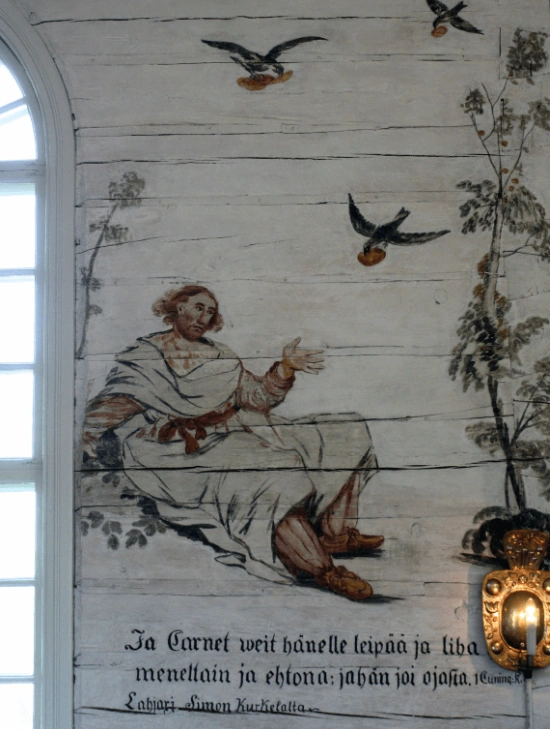9373. Come up unto Jehovah. That this signifies conjunction with the Lord, is evident from the signification of “coming up,” as being to be raised toward interior things (see n. 3084, 4539, 4969, 5406, 5817, 6007), consequently also to be conjoined (n. 8760). That it denotes conjunction with the Lord, is because by “Jehovah” in the Word is meant the the Lord, (n. 1343, 1736, 1793, 2004, 2005, 2018, 2025, 2921, 3023, 3035, 5663, 6280, 6303, 6905, 8274, 8864, 9315). A secret which also lies hidden in the internal sense of these words, is that the sons of Jacob, over whom Moses was the head, were not called and chosen; but they themselves insisted that Divine worship should be instituted among them (according to wh at has been said in n. 4290, 4293); and therefore it is here said, “and He said unto Moses, Come up unto Jehovah,” as if not Jehovah, but another, had said that he should come up. For the same reason in what follows it is said that “the people should not go up” (verse 2); and that “Jehovah sent not His hand unto the sons of Israel who were set apart” (verse 11); and that “the appearance of the glory of Jehovah was like devouring fire on the top of the mountain in the eyes of the sons of Israel” (verse 17); and lastly that Moses, being called the seventh day, “entered into the midst of the cloud.” For by “the cloud” is meant the Word in the letter (n. 5922, 6343, 6752, 6832, 8106, 8443, 8781); and with the sons of Jacob the Word was separated from its internal sense, because they were in external worship without internal, as can be clearly seen from the fact that now, as before, they said, “all the words which Jehovah hath spoken we will do” (verse 3); and yet scarcely forty days afterward they worshiped a golden calf instead of Jehovah; which shows that this was hidden in their hearts while they were saying with their lips that they would serve Jehovah alone. But nevertheless those who are meant by “the called and the chosen” are those who are in internal worship, and who from internal worship are in external; that is, those who are in love to and faith in the Lord, and from this in love toward the neighbor.
Elijah

Elijah (referred to as Elias in the New Testament) was the renowned prophet sent to the split kingdoms of Israel and Judah. His first appearance is in Chapter 17 of I Kings where he comes to speak to Ahab, king of Israel. He contends with Ahab, and Ahab’s wife Jezebel, and later Ahab’s son Ahaziah. These contentions have passed down to us in many well known stories.
In II Kings, Chapter 2, Elijah is carried up to heaven in a chariot of fire, and his mantle is given to Elisha, his disciple and successor. Elijah represents the Lord as He comes to us in the Word, that is, the way we think about the Lord when we read the Word (especially the prophetic parts of the Word). Elijah and John the Baptist are similar in their symbolic meaning.
(références: Arcana Coelestia 5247 [6], 6752, 9372 [2])
Heaven and Hell #13
13. The Lord's Divine Nature in Heaven Is Love for Him and Thoughtfulness toward One's Neighbor
In heaven, the divine nature that emanates from the Lord is called divine truth, for reasons that will be given below. This divine truth flows into heaven from the Lord, out of his divine love. Divine love and the divine truth that derives from it are like the sun's fire and the light that comes from it in our world. The love is like the sun's fire, and the derivative truth is like the light from the sun. By reason of correspondence, fire means love and light means the truth that flows from it. 1
This enables us to determine the character of the divine truth that emanates from divine love: in its essence, it is divine good united to divine truth, and because it is united, it gives life to everything in heaven the way the warmth of the sun, united to its light, makes everything fruitful on earth in spring and summer. It is different when the warmth is not united to light, when the light is therefore cold. Then everything slows down and lies there, snuffed out.
The divine good we have compared to warmth is the good of love within and among angels, and the divine truth we have compared to light is the means and the source of this good of love.
Notes de bas de page:
1. [Swedenborg's footnote] In the Word, fire means love in both senses [that is, love for good and for evil]: 934, 4906, 5215; holy and heavenly fire means divine love and every affection that belongs to it: 934, 6314, 6832; the derivative light means the truth that flows from the good of love, and light in heaven is divine truth: 3395 [3195?], 3485, 3636, 3643, 3993, 4302, 4413, 9548, 9684.






